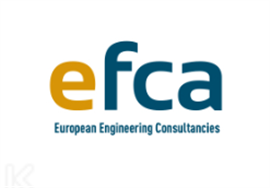Why engineers must embrace uncertainty
16 November 2023
Fewer available engineers, emerging technology, a planet which – its resources ravaged for too many years by the so-called most advanced of its inhabitants – appears to be openly rebelling, unleashing ever more destructive storms, earthquakes and other climate-related catastrophes…
How is the consulting engineering sector supposed to navigate the accelerating pace of change?
 Today’s construction engineers must be adaptable and future-ready. Photo: Adobe Stock
Today’s construction engineers must be adaptable and future-ready. Photo: Adobe Stock
This month, EFCA publishes the third in a trilogy of reports by its Future Trends Committee. The playbook is a tool for firms in our sector, aimed at helping them to future-proof their businesses.
A combination of classic change management theory and tools and case studies more specific to the sector, the playbook contains several self-assessment questionnaires, which can be used to run a check-up and answer the question “How do I get future-ready?”
Understand the impact of overload on employees
We have never been more aware of the impact of an unmanageable workload than we are today.
Modern firms address this phenomenon head-on and the playbook invites firms to ask their employees about their perception of their workload.
It then offers remedies in the form of rather obvious, but sometimes neglected ways of working via better internal communication and more team thinking and shared objectives and responsibility.
On its own, such collaboration has an impact, but when coupled with digital design solutions, which by their nature require collaboration, there are multiple benefits.
First-movers take risks but reap benefits
BIM is so last-decade that it hardly seems worth mentioning, but as it becomes the norm, pre-BIM design and construction look prehistoric.
The playbook talks about the importance of accepting obsolescence and contains a case study, where such thinking enabled a company to modernise.
History is full of stories about companies that didn’t accept that their flagship product or service was on the wane.
Being a first mover, adopting emerging technologies as well as letting go of processes and technologies that are past their sell-by date requires an approach, which is covered in the chapter about dynamic capabilities.
In short, proactive scanning of the external environment, researching and learning about what is discovered and adopting it with an entrepreneurial spirit – along with acceptance of some risk – builds resilience. This applies to engineering firms as well as to the infrastructure they are designing.
Humans and AI as employees – a dream team?
Tomes have already been published about the poison or cure that is AI. Robots have already been in use for years in other industries and are being seen on construction sites, but do we in EFCA believe that AI will take over from engineers?
In short, no. Used wisely, AI will support engineers in ways that we do not yet completely understand. With increasingly competitive recruitment of young talent a daily headache for bosses, ensuring that young engineers have the newest digital aids at their disposal will be essential.
The playbook helps companies to assess the extent to which they are ready to adopt innovation.
Seeing regulation as an opportunity
Readers of Construction Europe will be very familiar with the green and digital transformation that is taking place.
The accompanying regulation might be seen as bureaucracy, but in most cases, regulation is a means to an end.
A collaborative approach enables firms to join in the essential process of updating regulations, contributing their knowledge to develop policy solutions that create opportunities for their business.
Quoting a past EFCA president, Benoît Clocheret, “engineers like complexity”. Engaging in the work of EFCA and its national Member Associations is the best way to bring the regulatory aspect into future-proofing the sector.
EFCA is currently preparing for the new EU political term, which starts after the European elections in June 2024. Regulation is complex, as is the process of creating and updating legislative acts.
The climate emergency, as well as integrating AI and boosting the required digital infrastructure, to ensure Europe’s autonomy, will be high on the agenda in the new work programme.
Rolling your eyes already? Then maybe it is time to see regulation in the same light as emerging technology.
You can take it as a threat and/or an expensive inconvenience, or you can face it head-on. Whatever firms choose, regulation will always be there and when developed intelligently, it protects firms, citizens and the environment.
Without some degree of enforcement, certain common goals will never be achieved. Being on the back foot will always put firms at a disadvantage. Deciding to be an active stakeholder can bring more certainty.
So, when asking “How do I get future-ready?” why not also ask the question “How do I shape the future regulatory environment?”
Stakeholder engagement in the run-up to the appointment of the new European Commissioners and the election of the new European Parliament is one way to bring some order into this unsettling, chaotic business environment.
The Future Trends report can be found here
 Sue Arundale, director general, EFCA. Photo: EFCA Sue Arundale, director general, EFCA. Photo: EFCA
Retrofit for purposeSue Arundale will be a panellist on KHL’s upcoming sustainability webinar, which will look at the state of retrofitting and renovation in Europe and beyond. The webinar will take place on Thursday, November 23, at 3pm (UK time); 4pm (CET); 10am (Washington DC time). |
For more information about the activities of EFCA, visit www.efcanet.org

STAY CONNECTED


Receive the information you need when you need it through our world-leading magazines, newsletters and daily briefings.
CONNECT WITH THE TEAM










